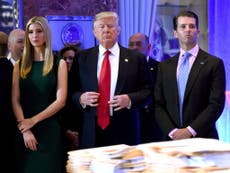The year in Trumpspeak: From his favourite child to his worst enemies, analysing the trends behind Trump’s comments
Ivanka represents different future for Republican party than Don Jr and Eric, says expert
It was not the 2020 Donald Trump expected.
Instead of riding a buoyant economy to a second term in the White House, the president underwent a bruising impeachment battle before the Covid pandemic killed more than 300,000 Americans.
After a spring and summer of racial division in the country, Trump’s leadership was then resoundingly rejected by voters.
But through all the turmoil, the outgoing president could count on the support of his children.
First daughter Ivanka Trump has been by her father’s side since he began his bid for the White House back in 2015.
But data show Ms Trump may have slipped down the family pecking order during 2020.
According to a database of the president’s speeches, tweets and interviews, Ms Trump lagged a long way behind her adult brothers in mentions by her father.
Donald Trump Jr paved the way in 2020 with 418 mentions, just ahead of his younger brother Eric who had 376, according to the factba.se website.
Ms Trump came in a distant third place with just 118 mentions.
But was just above Barron Trump, 107 mentions, and Tiffany Trump with 44.
“The Trump siblings represent the two paths that the Republican party can pursue in the coming years,” said Dr Steven Buckley, an associate lecturer at the University of the West of England, who studies US media, politics and social media.
“Ivanka represents the more measured, 'traditional' Republican who is interested in smaller government and lower taxes.
“The brothers represent the culture war focused wing of the party, which their father currently occupies.
“They pursue policy with the end goal of 'owning the libs' not for the merits of policy itself.
“I believe one of the reasons President Trump mentioned and retweeted his sons more than his daughter is that he sees his style of politics reflected in them.
“Plus the fact they are far more vocal on social media, talking about the sort of things that Trump likes to hear.”
In its database, factba.se brought together all of Mr Trump’s debates, deposition or testimony, interviews, op-eds, position papers, press conferences, press gaggles, remarks, speeches, video logs, Twitter and deleted tweets.
And it shows that Ivanka’s mentions by her father are way down on 2019, when she was the most popular of the Trump children for the president to mention.
“Ivanka likely limited her visibility during the campaign as she wishes to return to her normal New York socialite life with some of the dignity she had when she began working in the White House intact,” added Dr Buckley.
“The brothers seem to care little about that world and see more money to be made in the right-wing grifting enterprises that dominate in the right-wing media circles.
“There is a lot of money to be made and power to be wielded by continuing to feed their father’s supporters the sort of rhetoric they want to hear.”
But of course it was not just his children that Mr Trump mentioned during his tumultuous 2020 as he targeted his political opponents and enemies.
President-elect Joe Biden bore the brunt of Mr Trump’s remarks and was called “Sleepy Joe” 716 times during the year.
Mr Trump’s former White House opponent Hillary Clinton was vilified by the president during their own battles, and in 2020 was still branded “Crooked Hillary” 123 times.
“Trump's use of name calling has certainly lowered the tone of public discourse,” added Dr Buckley.
“However he is arguably echoing the tone of rhetoric that he has heard from the right-wing media that he consumed.
“Over the past 20 years politics has certainly become more driven by personality and emotions, and media coverage has reflected this.“
One of Mr Trump’s favourite other targets has been Democratic Senator Elizabeth Warren, whom he has called ‘Pocahontas’ because of her changing claims of having Native American ancestry.
During 2020, the president used the nickname to belittle the former challenger for the Democratic presidential nomination 149 times.
Mr Trump has always enjoyed taking a swing at Senator Bernie Sanders, who he referred to as “Crazy Bernie” 192 times.
The president also has targets in Congress, and he has called Speaker Nancy Pelosi “Crazy Nancy” 90 times and branded California congressman Adam Schiff, who led his House impeachment investigation, as “Shifty Schiff” 67 times.
“What this means for politics in America going forward is largely going to be determined by how the media reacts,” said Dr Buckley.
“If the media continues to reward political actors who promote personal politics over policy with attention, then Trump's style of politics is likely to continue.
“If however the media chooses to focus on policy, then not only would this serve the public better, but it may also help halt the trend of nasty, divisive politics that has gripped America during Trump's presidency.
“Society elects leaders who they think will best serve their needs.
“In 2016 enough Americans felt that name calling and bombastic language would help them best.
“Rather than Trump's use of name calling saying a lot about his own character, I believe it said more about the character of America in 2016.
“Happily, in 2020 the desire for calm and measured discourse prevailed and one can but hope that the tone of politics will shift accordingly over the next four years.”
Subscribe to Independent Premium to bookmark this article
Want to bookmark your favourite articles and stories to read or reference later? Start your Independent Premium subscription today.






Join our commenting forum
Join thought-provoking conversations, follow other Independent readers and see their replies
Comments